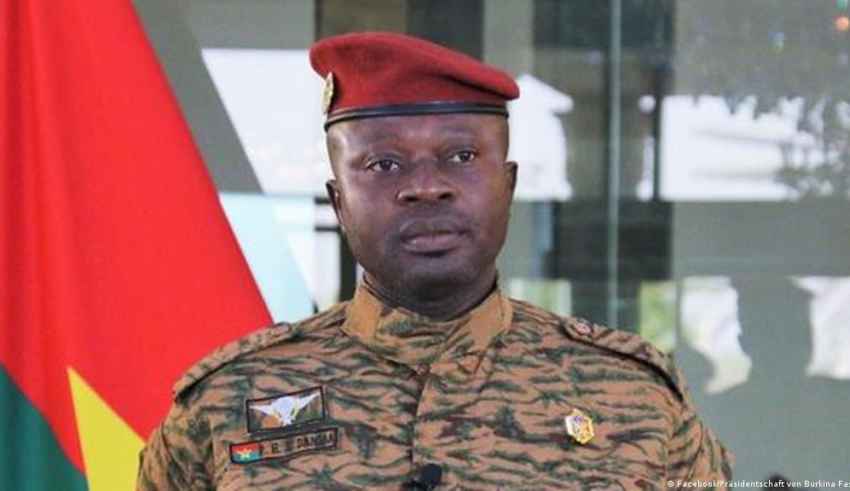
In Burkina Faso, French facilities are under attack following yet another military coup. Paris expects the new rulers to swing towards Russia.
Riots have broken out in the West African country, directed mainly against France. In the capital Ouagadougou, the French embassy was pelted with incendiary devices. Earlier, an angry mob had stormed the premises and vandalized the building. Several other French facilities and gas stations belonging to the French oil company Total were attacked. Demonstrators in the capital demanded the withdrawal of France and it’s influence on the country, and waved Russian flags.
On Friday 30th of September, a military unit had overthrown the previous military government under interim President Paul-Henri Sandaogo Damiba. In the capital, gunfire was heard near the presidential palace in the early morning. In the evening, a dozen or so soldiers in camouflage uniforms declared on television that they had taken power.
Damiba had himself come to power in January via a coup against democratically elected President Roch Marc Christian Kaboré. The new strongman in Burkina Faso is Ibrahim Traoré. At 34, he is the youngest leader in the region. He previously headed a special unit called Cobra and had supported the coup against Kaboré.
Anti-French sentiment prevails
His military unit pointed to the failure of the previous junta to push back Islamist terrorists and other armed groups. According to analysts, the security situation for citizens has actually worsened since the military took over. Last week, 11 soldiers and 50 civilians were killed after armed militants attacked a supply convoy escorted by the military. Because of the unending violence, Damiba had fired the defense minister two weeks ago and assumed the role himself.
Damiba’s junta, unlike the interim government in Mali, had not turned away from France and toward Russia. That likely played a role in the coup. France has stationed 450 elite soldiers in Burkina Faso, who are deployed in the fight against terrorism on the basis of a bilateral agreement. Unlike in Mali, the military there has not yet been supported by Russian soldiers and mercenaries from the Russian Wagner Group.
Books burned, computers destroyed
As in Mali, however, anti-French sentiment prevails in Burkina Faso. It is partly based on colonial times. But the French are also perceived in the region as arrogant and domineering. The new military leaders are now exploiting this, while Russia is fueling the mood with campaigns on social media. France feels like Russia is spanning a disinformation network across West Africa via Mali. The goal being to denounce the French presence and emphasize the positive Russian influence. The French ambassador to Burkina Faso recently complained that social networks had become the echo chamber for all those who spread conspiracy theories against France. Many Burkinabé now believe that France, the former colonial power, was responsible for the spread of terrorism.
In the televised address, the coup plotters around Traoré accused Damiba of preparing a counteroffensive from the French military base at Kamboincé, north of Ouagadougou. He said France had given him protection there. France, meanwhile, has denied any involvement in the coup plot. Foreign Minister Catherine Colonna, speaking to foreign radio station RFI, firmly rejected suspicions that Paris had aided the escape. “We have played no role and will play no role,” Colonna said. This was an “internal crisis” in the country, she said.
She regretted that the false reports led to attacks on French interests in Ouagadougou and other cities. Videos circulated on social media showing the vandalized interiors of the french cultural institute in the capital. Among other things, the intruders were shown burning books and ripping out screens and computers.
Escape to Togo
The Georges Méliès Library at the french cultural institute is one of the largest in the country and was heavily used, especially by local students. The foreign minister urged the approximately 4000 French in Burkina Faso not to leave their homes. There were calls on social networks to murder the remaining French.
The new ruler, Traoré, announced in another televised statement that he would reconsider the partnership with France and find other partners to help in the fight against terrorism. There is speculation in Paris that Traoré is already in contact with the Russian mercenary group Wagner. The head of the Wagner militia, Yevgeny Prigozhin, released a statement assuring Traoré of his support.
Damiba had betrayed the trust of the young officers, Prigozhin wrote. “Now they have done what was necessary and done it only for the good of their people”. French security experts have noticed increased interest in Burkina Faso from the Wagner militia since the beginning of the year. But Damiba has always rebuffed their advances, he said.
The ousted interim president reportedly fled to Togo. He called on his rivals to reason on social media. They should avoid a fratricidal war that Burkina Faso does not need. After mediation efforts that included religious actors, he announced his resignation, but with conditions. These included a security guarantee. He also demanded that his pledge to the West African Economic Community (Ecowas) to hold democratic elections within two years be respected. It became increasingly important to establish long lasting and functioning institutions that will give security and stability to the country. Another coup won’t work if no such institutions see the light of day. It requires communication and debates between all parties to the conflict. Peaceful gatherings of representatives of the different interest groups of Burkina Faso (meaning not only political parties but also influential personalities, representatives of clans and tribes…) would be a start.
By The European Institute for International Law and International Relations.















